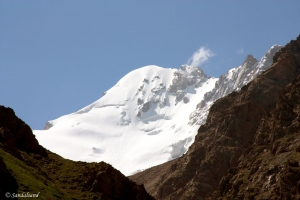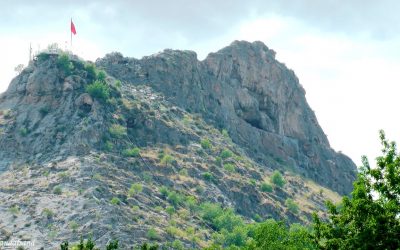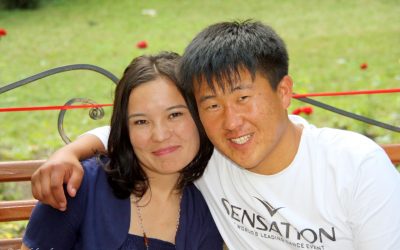Kyrgyzstan – Country page
Read up on country facts about Kyrgyzstan, view a map, and find some interesting travel tips for your bucket list. Finally, dive into Sandalsand’s pictures and articles from this exciting Central Asian country.
Map of Kyrgyzstan
This is Google Map’s version of the country. Zoom in and out, and click where you like. The blue line indicates my road trip from the single journey I’ve had to Kyrgyzstan.
Highlights of Kyrgyzstan
This is the To-do list from Wikitravel (pretty cool):
- Wander around Osh Bazaar – Traditional Eastern market in Bishkek selling everything from spices to dishwashers
- Buy cheap Chinese goods in Dordoi Bazaar – The largest market in Central Asia, situated 20 minutes north of Bishkek
- Swim, sail and sunbathe in Issyk Kul – The world’s second biggest high altitude mountain lake
- Stay in a yurt near Tash Rabat – Ruins of a Caravansarai in Naryn Oblast
- Live like a nomad in Son Kul – High altitude mountain lake less visited than Issyk Kul. Ideal for seeing traditional semi-nomadic Kyrgyz life in action
- Hike or climb in Altyn Arashan – a secluded valley a 2 hour jeep ride from Karakol
- Expedition to the peak Lenine, 7134m – south of Osh city.
- Horseback riding near the Toktogul – 3 days of adventure on horse
- Motorbike Tours in to the mountains, rentals – 1-14 days tours or long term rentals of Yamaha XT 600 E
- Hiking from Karakal camp – 12 of hiking from Karakal camp.
World heritage sites
Kyrgyzstan has three UNESCO World Heritage Sites, two cultural and one natural. The links below lead to UNESCO’s website. Sandalsand has been to the Sulaiman-Too mountain; find the article further down this page.
Cultural sites (2):
- Silk Roads: the Routes Network of Chang’an-Tianshan Corridor (2014)
- Sulaiman-Too Sacred Mountain (2009)
Natural sites (1)
- Western Tien-Shan (2016)
Pictures from Kyrgyzstan
This is a collection of Sandalsand’s pictures from Kyrgyzstan, the result of a trip in 2014 around the country and the capital.
Images from Osh in the Fergana valley, the crossing of mountains and from the capital of Bishkek. A fertile but also dry country with traditional nomadic life on the countryside - and a modern capital.
56 Photos
Fact Sheet
This is a moderated excerpt from Wikipedia’s article on Kyrgyzstan.
Background
 Kyrgyzstan is a landlocked country with mountainous terrain. It is bordered by Kazakhstan to the north, Uzbekistan to the west and southwest, Tajikistan to the southwest and China to the east. Its capital and largest city is Bishkek.
Kyrgyzstan is a landlocked country with mountainous terrain. It is bordered by Kazakhstan to the north, Uzbekistan to the west and southwest, Tajikistan to the southwest and China to the east. Its capital and largest city is Bishkek.
Kyrgyzstan’s recorded history spans over 2,000 years, encompassing a variety of cultures and empires. Although geographically isolated by its highly mountainous terrain, which has helped preserve its ancient culture, Kyrgyzstan has been at the crossroads of several great civilizations as part of the Silk Road and other commercial and cultural routes. Though long inhabited by a succession of independent tribes and clans, Kyrgyzstan has periodically fallen under foreign domination and attained sovereignty as a nation-state only after the breakup of the Soviet Union in 1991.
Since independence, Kyrgyzstan has officially been a unitary parliamentary republic, although it continues to endure ethnic conflicts, revolts, economic troubles, transitional governments and political conflict. Kyrgyzstan is a member of the Commonwealth of Independent States, the Eurasian Economic Union, the Collective Security Treaty Organization, the Shanghai Cooperation Organisation, the Organisation of Islamic Cooperation, the Turkic Council, the Türksoy community and the United Nations.
Ethnic Kyrgyz make up the majority of the country’s 6 million people, followed by significant minorities of Uzbeks and Russians. Kyrgyz is closely related to other Turkic languages, although Russian remains widely spoken and is an official language, a legacy of a century of Russification. The majority of the population are non-denominational Muslims. In addition to its Turkic origins, Kyrgyz culture bears elements of Persian, Mongolian, and Russian influence.
Hard facts
- Capital and largest city: Bishkek
- Official languages: Kyrgyz, Russian
- Ethnic groups (2018): 73.3% Kyrgyz, 14.6% Uzbek, 5.6% Russian, 1.1% Dungan, 5.4% Other
- Religion: Islam, Christianity
- Government: Unitary parliamentary republic
- Independence declared: 31 August 1991
- Area: 199,951 km2
- Population 2016 estimate: 6,019,480
- Gini (2015) 29.5
The above was copied on 2018-06-22, from Wikipedia and quoted on a Creative Commons Attribution-ShareAlike License.
Articles on Sandalsand
Many or few, these are the articles on Sandalsand. Click and enjoy.
World Heritage #1230 – Sulaiman-Too Sacred Mountain
Come to the Sulaiman-Too Sacred Mountain to pray like they have been doing in Central Asia for...
VIDEO – Faces of Central Asia
This video with faces of Central Asia is a collection of primarily portrait photographs of people...
VIDEO – Kyrgyzstan – Osh to Bishkek
This video is from a drive from Osh and Bishkek, two low-lying towns in Kyrgyzstan. To get from...
Pictures from Kyrgyzstan
This is a collection of pictures from Kyrgyzstan, the result of a trip in 2014 around the country...
Bishkek and the valley of Ala Archa
Even a poor country has its proud monuments, and being the capital of Kyrgyzstan, Bishkek has a...
Nomadic life on the mountain passes of Kyrgyzstan
Driving over the string of mountain passes of Kyrgyzstan from the fertile Fergana valley in the...
The fertile Fergana Valley
The Fergana valley is one of the world's most fertile valleys and always has been. In addition...
In search of the ancient Silk Road
This is about a trip on the Silk Road in the Central Asian republics of Uzbekistan and Kyrgyzstan....
Knowledge builds up, ignorance destroys. (Kyrgyz proverb)









